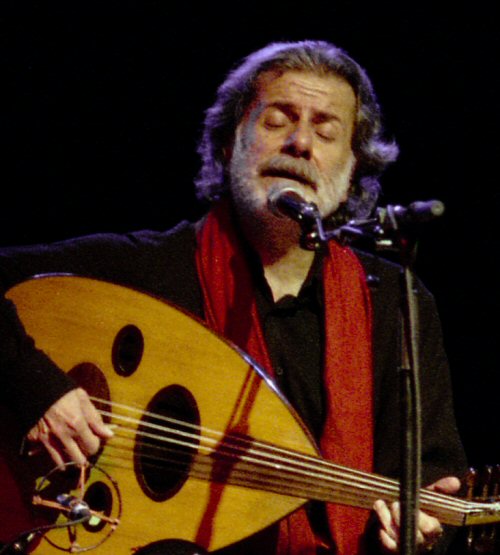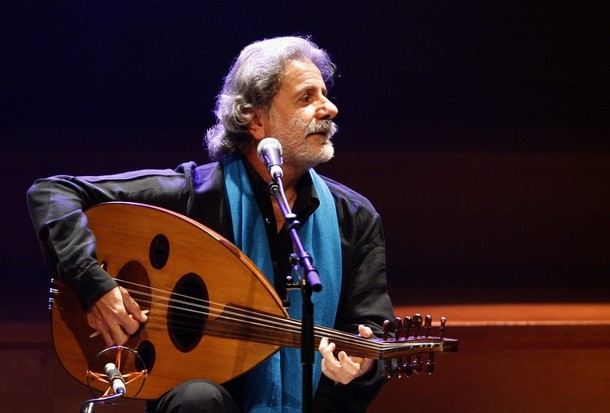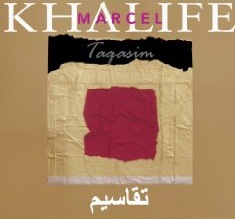The Dylan of Lebanon
Marcel Khalife Promotes An Expanded Vision of Traditional Arabic Music
‘Since I was born I've felt I had a rebel's soul within me. I rejected things that might be inherited, but that were wrong.’by David McGee
In the Arabic world few artists have been more dogged than Marcel Khalife in promoting a greater understanding of their culture's music to audiences around the globe, including in English-speaking countries. His voice is especially valuable in the United States, where too many people are positively spooked by the very mention of anything Arabic, and concurrently lacking in much background on the region's history, values and culture, except as it is filtered through the lens of Islamic extremism or ethnic strife within its own ranks. This is not the Arabic world Mr. Khalife knows or wants the rest of the planet to accept as gospel.
Born in Lebanon to a Christian family, he has been called "the Dylan of Lebanon" for his topical songs and advocacy for the rights of Palestinian refugees. He understands oppression from a personal standpoint: three times—in 1996, 1999 and 2003—he has been put on trial for his song "I am Joseph, O Father," written by the Palestinian poet Mahmoud Darwish, who included in his lyrics a two-line verse from a chapter of the Qur'an, leading to a charge against Mr. Khalife of insulting religious values and blasphemy after Sunni Muslim clerics in Lebanon declared that singing verses from the Qur'an was "absolutely banned and not accepted." Intellectuals, artists, human rights organizations and fans spoke out in Mr. Khalife's defense, with Mr. Darwish being among the most vocal. "Fundamentalism is in the process of stifling culture and creation in the Arab world," Mr. Darwish has said. "I say it is shameful. I am ashamed. We should all be ashamed. If Marcel Khalife is found guilty, it will be an insult to culture."
In an eloquent decision that bore resemblance to the common sense and literary skills demonstrated by legendary U.S. Supreme Court Justices Learned Hand and William O. Douglas, the presiding judge in Mr. Khalife's case found him innocent of the charge of degrading Islam and observed: "...it is clear from listening to the tape and CD at hand that the defendant has chanted the poem in gravity and composure that reveal a deep perception of the humanism expressed in the poem ornamented with the holy phrase. [He is] committed in his expression—in form and content—to a performance that bears no infringement on the holiness of the Qur'anic text, or offense to it or its content, nor reveal any intent to incite disparagement of it explicitly or implicitly, neither by words, meaning, nor music."
Born in 1950 in Amchit, a small village in the north of Beirut, Marcel Khalife grew up among fishermen (such as his flute-playing grandfather) and peasants, and studied the oud at Beirut's National Academy of Music. By the time he arrived at the National Academy, he was primed to take his native land's music towards new horizons he envisioned while growing up in two cultures. "I used to go to church and listen to Christian music, and also to Islamic recitations of the Qur'an," he has pointed out. "In Lebanon we have a marriage of Islamic and Christian culture. That really helped to form my musical awareness."
’In Lebanon we have a marriage of Islamic and Christian culture. That really helped to form my musical awareness.’From 1970 to 1975 he taught at various schools in Beirut and toured widely—not only throughout the Middle East, but also in Europe, North Africa and the U.S. In 1972, intent on reviving his homeland's musical heritage, he formed a musical group that continued performing concerts even as the Lebanese civil war raged in 1975—he even played bombed-out concert halls, explaining, "My music is for the service of humanity, and is intended to present a serious and sincere work for those tormented in this destructive war. My music was a sort of balm for those wounds."
But what he brought to the beleaguered souls attending his concerts was more than their culture's traditional music; it was a vision of traditional music expanded beyond its stereotypes to embrace multicultural influences, by employing, for instance, a piano in his group, and by incorporating lyrics from formidable modern Arab poets such as Mahmoud Darwish, who takes on contemporary political and social issues and is a fervent pro-revolutionary.
It was the 1975 formation of the Al Mayadeen Ensemble that brought Mr. Khalife to wide international acclaim as it performed, essentially, all over the eastern and western world, in prestigious venues such as Merkin Hall in New York City, the Place des Arts in Montreal, New England Conservatory in Boston, the Royal Festival Hall in London and the Cairo Opera House. In 2004, as a solo artist, he performed at the Kennedy Center in Washington, D.C. He made his debut on record in 1976 with Promises of the Storm, and has since released 14 more albums and a DVD, Sharq. His 2004 album, Caress, features jazz bassist Peter Herbert and Mr. Khalife's sons, pianist Rami and percussionist Bachar.
The young Marcel Khalife leads an audience singalong on ‘shiddo el-himmi’His obvious border-crossing appeal has not stopped him from being harassed at home and abroad. When Israel invaded his country in 1982, his cassettes were seized. In 2005 the state-controlled radio and TV in Tunisia banned his music after he dedicated one of his concert numbers to Arabs imprisoned in Israel and in other Arab countries, and expressed his support for hunger striking activists protesting the World Summit On Information Society gathering in Tunisia. Returning to Tunisia to perform in 2009, he greeted concertgoers with: "People of Tunisia, good evening. This night, like all nights in Tunisia, has a special taste. In spite of all the collapses and defeats around the world, Tunisians are still the kind of people who have a special taste and love. They do not broadcast my songs and concerts on TV, but I know that my public keeps on listening to me." Later in the show he dedicated a song to "revolutionary leader Che Guevara."
Although noted for his songs, in recent years Mr. Khalife (who now make his home in Paris) has immersed himself in composing classically based instrumental works, such as Arabian Concerto, Chants of the East, Suite for Oud and Orchestra, among others. Several orchestras, including the Kiev Symphony Orchestra and the San Francisco Chamber Orchestra, have performed his compositions. "When the text is absent, I find myself more comfortable in composing music, although this need not suggest that I am ignoring the song, which is essential to me," he has explained of this transition in his focus. "Rather, my real interest lies in musical composition. This was present in early compositions like ‘Rita,’ ‘Aaras (Weddings)’ and ‘Tusbahouna ala Watan (Ode to Homeland).’ Each of these was a musical composition and not just music written for songs. In these works, whenever the lyrics stop the music continues; and whenever I feel the lyrics are incomplete, they are completed by music."
In addition to composing music for film soundtracks, documentaries and theatrical films, Mr. Khalife turned author in 1981 with the publication of Al Samaa, a collection of compositions for various traditional Arab musical instruments. In 1982 he published a six-part Anthology of Studying the Oud as part of his commitment to documenting Arabic music traditions, thereby filling an historical gap for future scholars. "We Arabs have no history of our music. In my judgment, we have linked music to singing, and it is time to write down the history of music, not just song." His other books include: Arabic Music-Theory and Practice (French Edition, 1984), Jadal oud Duo (1996), OUD (1997) and Andalusian Suite for oud and Orchestra (2002).
Awards accorded Mr. Kherife comprise an imposing list, including: The Intellectual Merit and Achievement Medal—Fez, Morocco 2008; Charles Cros Award (World Music category)—Paris, France 2008; World Lebanese Cultural Union Medal—Beirut, Lebanon 2008; Cultural Movement Award—Antelias, Lebanon 2008; Freemuse Ambassador—Copenhagen, Denmark 2007; UNESCO Artist For Peace, Paris, France 2005; The Lebanese Cedar Medal—Presidential Award, Lebanon 2005; The National Palestine Medal—Palestine, 2001; Algerian Ministry of Youth Award—Algiers, Algeria 1984.
An excerpt from ‘Taqasim,’ the composition by Marcel Khalife dedicated as a tribute and an expression of fidelity to the late Palestinian poet Mahmoud DarwishQuestioned by Los Angeles Times reporter Elijah Wald in 2007 about the seemingly incessant flow of disturbing news from his homeland, Mr. Khalife lamented what he sees as a one-side portrait the media is painting of his part of the world. "That is very hard," he said. "They always write about that, and if there is also beauty, they do not write about it. Not only in Lebanon but in the whole region, there are great traditions of music, of poetry, of song, of performance, and it is too bad that the media sees only war.
"It was not us who started these wars; they come from outside, with colonization. So we need to say 'No'—no to war. That is what I hope to do with my concerts: to give a different view of the region, another vision of the culture." (source: Los Angeles Times, Oct. 10, 2007)
Not the least of Mr. Kherife's honors has been to be the target of wild-eyed broadsides in print and on TV from right wing lunatic Islamophobe Debbie Schlussel, a Fox News regular, who says of Muslims: "They are here on our shores, pretending to be loyal Americans, and they are plotting to take over our country." Seeing a Muslim spy under ever bed much the way Commie-hunters of the '50s did their favorite bugbear, she has questioned President Barack Obama's patriotism based on his father being Muslim. In Mr. Kherife she sees a similarity to anti-Semitic German composer Richard Wagner, calling the former an "Arab, pan-Islamist version" of Wagner and declaring that "his plays and songs have served as inspiration for Hezbollah, Lebanese Communist and Palestinian terrorists in their slaughter of innocent Israelis and Lebanese, including members of the South Lebanese Army (SLA), which fought off Hezbollah for many years." She was positively apoplectic over his arrival in the U.S. in 2007, describing him as a "muse for barbarians" and denouncing by association every group that sponsored his concerts on these shores.
On the other hand, Siwar Bandar, Communications Coordinator of the American-Arab Anti-Discrimination Committee, reported some enlightening comments made by Mr. Kherife at a reception at the Palestine Institute in 2004: “In his songs, Khalife insisted, he works for himself, not for any larger good or moral high ground. ‘My music is never reactive to a specific event in history or incident,’ Khalife answered one audience member who asked if he would compose a song about Iraq. Instead he went on to say that it is a summary of emotions that lie outside the context of time. Khalife doesn't sympathize for people or causes; he empathizes emotions and internal struggle through his voice and instrument.”
In His Own Words: Marcel Khalife
‘Nothing justifies our art other than to speak for those who cannot speak’"There is nothing else like creation and culture to stimulate the expansion of the brain in humans, creatures who especially distinguish themselves by their aptitude to dream."
"Nothing justifies our art other than to speak for those who cannot speak."
On the Spanish-Arabic musical linkage: "The music of al-Andalus is the origin of Spanish music and the Arabs contributed tremendously to that. Flamenco, for example, has Arabic origins and we must clarify that this [Spain] was the Maghreb of the Arab world, which explains the work with oud and guitar. If the music of al-Andalus was able to continue and evolve it would have reached great sophistication. But a 600-year interruption had a detrimental effect on Arabic and Andalusian music."
On his music being banned: "No matter how much they try to ban the music, it will find its way into these countries, and the people will listen. I think it is foolish that (the governments) are afraid of music."
"We don't want to burden people with problems—our work is to relieve them from their problems and reduce their torment. Our work is to serve humanity and at the same time attempt to evolve Arab music from the heart."
"I do not fit in a cultural box, nor do I want to. I have strived all my life to break free of old traditional constraints, to let music speak for itself unshackled by predetermined traditional rules. I have defied identities and categorizations, which only serve to blind us to the vastness and complexity of humanity. There are no set lenses with which I should be looked at. My music, it all comes together for the sake of humanity."
"I do not use the West to get to the West. If the new world order gives me the culture of McDonalds and Pepsi Cola, I question that. Those things disappear after a short while. What we are doing is a project that will take years and years."
"Since I was born I've felt I had a rebel's soul within me. I rejected things that might be inherited, but that were wrong."
"When we plumbed the depths of our Arab heritage searching for a luminous gem to light up our present and restore what has been forgotten or lost from our lives today, which is love, we brought back a pearl of everlasting incandescence, indeed a torch, whose flame never dies out so long as two souls love."
(excerpt from a review of Marcel Khalife's 2007 album, Taqasim, by Sami Asmar for Aljadid, "A Review & Record of Arab Culture and Arts" at www.aljadid.com/reviews/singing-marcel-khalife.html)It was a harmonious surprise when renowned Lebanese composer/singer/'ud player Marcel Khalife released a new CD of 'ud improvisation titled Taqasim (Nagam Records). The surprising aspect is that Khalife's career has progressed from writing music strictly for vocals to composing music for music's sake, underscoring that Arab civilization must also progress beyond music as simply accompaniment to singing. He has contributed to this goal producing instrumental compositions with what has been called "Western rigor," including detailed documented notation, practically preventing improvisation as exemplified in his CD for two 'uds, Jadal. Therefore, his audiences have not expected him to improvise during live performances, at least not in the traditional style. But, Marcel Khalife often surprises us.
The Taqasim CD, a three-part work accompanied by the virtuoso double bass player Peter Herbert and Marcel's son Bachar Khalife on percussions, is a collection of themes, thoughts expressed with flowing creativity and occasional revelations—strictly and typically Marcel. He atones for the absence of vocals with what is nothing short of a singing 'ud. Not surprisingly, the 'ud sings the unspoken words of Mahmoud Darwish, the Palestinian poet to whom the CD is dedicated. Marcel has been linked with Darwish's poetry for most of his career and this CD of instrumental improvisations, according to Khalife, ironically and articulately intones the voice and poetry of Mahmoud Darwish more than ever.
And from Marcel Khalife himself, this note on the inspiration for Taqasim: I specifically intended this set of Taqasim as a tribute and an expression of fidelity to Mahmoud Darwish. Some may wonder, as they listen to Taqasim, about the meaning of this dedication, for no part can be found in the score for the poetry of Darwish or for my own voice. Yet, nowhere have his poetry and my voice been as intensely present as in this work.
Visit Marcel Khalife's website (www.marcelkhalife.com/index.html) for more information about his current projects and other news. All of his CDs are available for purchase there, and clicking on the album covers will launch a music player for those who want to sample the work therein. It's one of the best artist websites we've encountered, and provides a tidy short course in the adventurous, fascinating, often haunting vocal and instrumental music Mr. Khalife has produced over the years. Highly recommended: the 2004 album, Caress/Mouda’aba. All of the artist’s albums are also available at www.amazon.com.
Founder/Publisher/Editor: David McGee
Contributing Editors: Billy Altman, Laura Fissinger, Christopher Hill, Derk Richardson
Logo Design: John Mendelsohn (www.johnmendelsohn.com)
Website Design: Kieran McGee (www.kieranmcgee.com)
Staff Photographers: Audrey Harrod (Louisville, KY; www.flickr.com/audreyharrod), Alicia Zappier (New York)
E-mail: [email protected]
Mailing Address: David McGee, 201 W. 85 St.—5B, New York, NY 10024






